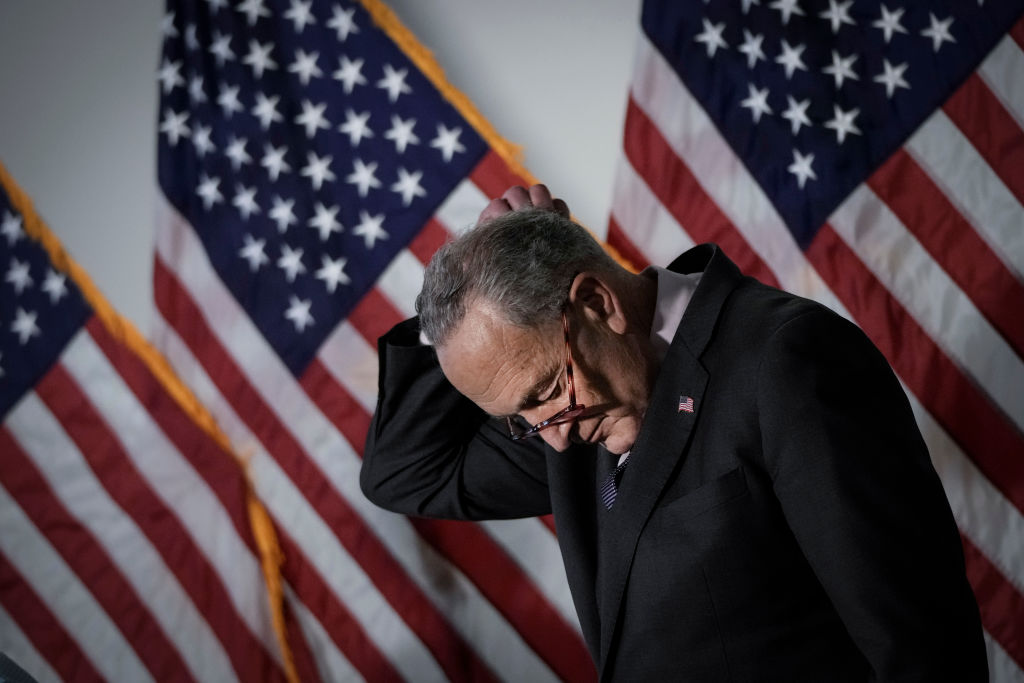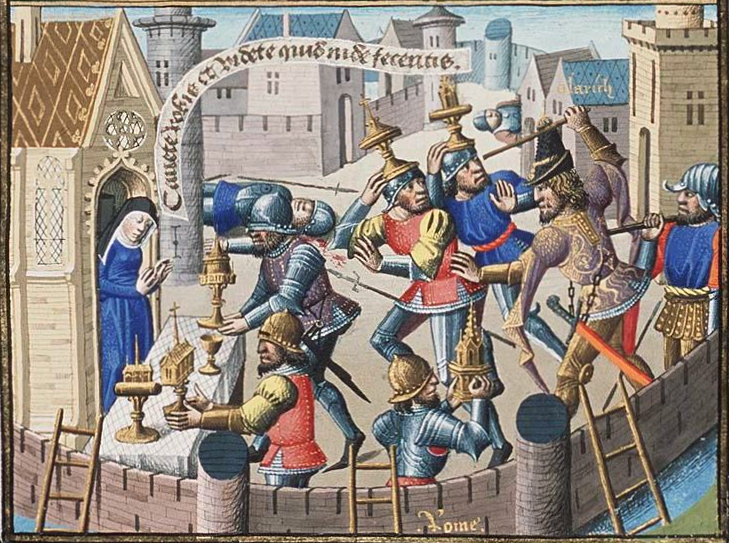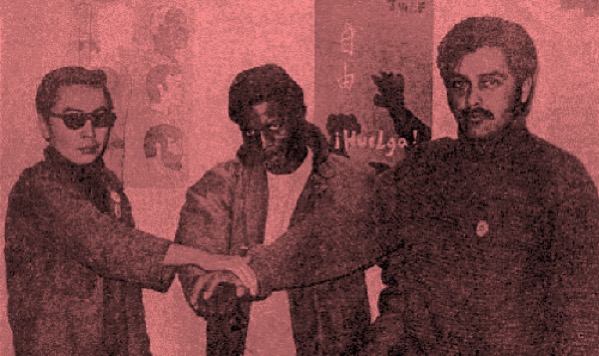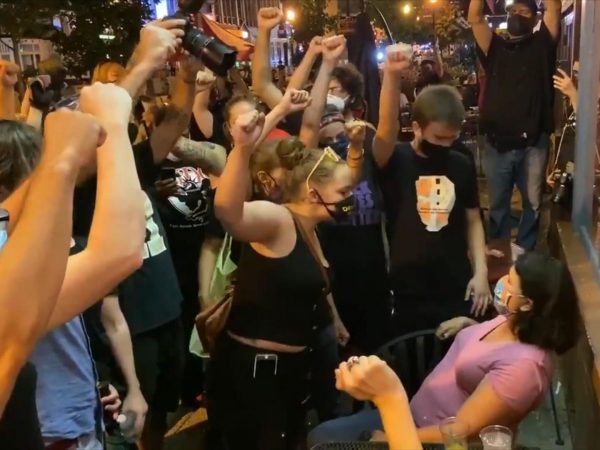Protecting our regime demands more attention to reality than to realism.
Why Jews Are Confused

Assailed from two sides, American Jewry is having an acute crisis of identity.
Es iz schver tzu zein a yid. (It is hard to be a Jew.)
—Sholem Aleichem
From missiles falling on Tel Aviv and the assault on synagogues during last summer’s riots to mob violence on the streets of LA and New York, the sense of well-being among America’s Jews has been shattered. After decades of relentless social and political ascendency, Jews now face rising anti-Semitism in ways not encountered in over half a century. Attacked from the far right, as well as an increasingly vitriolic far left, Jews are pincered and suffering whiplash.
Amidst what Hoover Institution fellow and Somali immigrant Ayaan Hirsi Ali describes as a rampant rise of “tribalism,” anti-Semitism is becoming normalized in America. Yet in the face of this rising risk, Jews themselves are divided and deeply conflicted. The Jewish establishment has generally focused on white nationalists as the prime threat and, to be sure, lone racists have expressed their anti-Semitism lethally from Kansas City and Pittsburgh to Poway. To a people who have experienced centuries of persecution from the Tsarist regime to the Nazis and the Klan, the far right’s elevated profile fueled by the power of social media—if not the actual size of the white nationalist movement—is nevertheless terrifying.
Yet this is not the real measure, or even the bulk, of the threat. Groups like the Anti-Defamation League focus on Islamists and right-wing hate groups, but their statistics have been roundly criticized in such respected magazines as Tablet, and are widely thought to reflect their increasingly progressive bias. The reality, missing from the mainstream narrative, ignores the arguably more potent threat from an aroused, and increasingly radicalized, left.
The roots of leftist anti-Semitism are nurtured in anti-Zionism that has been brewing for a half century on the left. But now, for the first time, even Congress has a band of anti-Zionists who denounce Israel’s strong response to missile attacks as a war crime. The assault on Israel’s right to self-defense—though still backed by President Biden—comes from the ascendant left faction of the Democrats—led by such figures as Rashida Tlaib and the openly anti-Semitic Ilhan Omar. They assign exclusive blame to Israel for their response to the mass missile attacks on their cities from groups like Hamas, whose genocidal urges are well demonstrated and enshrined in the group’s founding documents, and whose Judenrein territorial goal, “from the river to the sea,” is now chanted by street mobs around the world, and tweeted by none other than the labor union at the New Yorker magazine.
Israel appears to have lost support among American Jews, particularly the younger and less affiliated. Having alienated the Obama administration with their West Bank settlement policies and opposition to the Iran nuclear agreement, Israeli policy-makers now worry more about Democratic Administrations. A former Israeli ambassador to the U.S. recently opined that Israel should prioritize the “passionate and unequivocal” support of evangelical Christians over that of American Jews, who he said are “disproportionately among our critics.” Certainly the new administration’s intent to return to the Iran accords are troubling, as are charges that John Kerry, the president climate czar, gave intelligence to the Iranians, who openly promote eradication of the Jewish state.
These divides are particularly dangerous as the community is aging rapidly, faces increasing pressures to assimilate, while major institutions are under pressures not seen in generations. Overall, the American Jewish population—unlike that of demographically robust Israel—is unlikely to grow by 2050. There is no likely replacement for the influx of Persian, North and South African, and Russian Jews who rescued the community from demographic decline over the last half century. It is also a community that is no longer the global center of Jewry, and has been replaced by Israel, a state that acts primarily in its own self-interest, sometimes in ways that upset many American Jews.
Although Trump made some modest gains among Jewish voters in 2020, the bulk of American Jews, nearing 70 percent according to Pew, identify with the Democratic Party. Jews are widely represented in the upper echelons of the Democratic Party, including Senate Majority Leader Charles Schumer and progressive icon Bernie Sanders, and are well represented in the media, academic, and corporate communities that have rallied behind President Biden. Democrats account for 36 out of the 38 Jews in Congress, and one-third of them are members of the far-left leaning Congressional Progressive Caucus, whose leading members, during the current hostilities, moved to block a planned $735 million weapons package for Israel.
Leading progressive Jews often embrace the notion of tikkun olam (“healing the world”) as the mission of the faith. In their mind, Jewish values are intrinsically progressive and point with pride to the community’s support for the African American civil rights movement, and their more recent unrequited backing for the Black Lives Matter movement and the Women’s March. Yet many of these groups are led in part by enthusiastic backers of the most influential anti-Semite of our time, National of Islam head Louis Farrakhan, who smirks that he is an “anti-termite” and insists that Jews controlled the slave trade, and other leaders who accuse Israel of genocide, and of running an apartheid state. Professedly anti-Zionist, BLM has allied with Islamist groups and disparaged Israel during last year’s DC demonstrations as well as during the recent Gaza conflict. BLM protests have also led to rioters vandalizing synagogues and trashing Jewish owned businesses in Los Angeles, New York, and Kenosha, Wisconsin.
Moreover, violent, unprovoked attacks on Jews in Los Angeles, New York, Boca Raton, Montreal, London, Argentina, Chile, Germany, Austria, Poland, Spain, Italy, Netherlands, and Turkey demonstrate that much of anti-Zionism is in reality anti-Semitism.
After the Holocaust, one would think Jews would stand united against these assaults but some, like the hapless rabbi in Kenosha, excused pro-Palestinian graffiti at her temple, suggesting it was “a trivial matter” compared with pressing issues like systemic racism. Jonathan Greenblatt, national director of the ADL, has suggested that “Jewish organizations are somewhat inured to … pro-Palestinian graffiti on a synagogue following a protest.”
Even more remarkable, the ADL, presumably the bulwark in the battle against anti-Semitism, has warmed to such figures as Al Sharpton, with his history of inciting pogroms, and reached out to BLM in pursuit of Black-Jewish dialogue.
The challenge extends beyond Congress and the ADL. Last week, a group of 100 rabbinic students from the major non-Orthodox seminaries signed an open letter denouncing Israel’s “violent suppression of human rights and … apartheid in the Palestinian territories, and the threat of annexation.”
Yet as the rabbinate and the establishment have embraced progressivism, they are leaving many of their former congregants behind. Over the past 20 years, the number of Reform and Conservative congregants have declined an average of 26 percent while only the Hasidic Chabad movement has grown, tripling in size. At its height in 2001, the Conservative movement had 877 affiliated synagogues throughout the United States; by 2021 that number had fallen to 566. Over the corresponding period, Reform movement synagogues fell from 963 to 808, and Modern and Traditional Orthodox fell from 1156 to 775 affiliated congregations.
The disconnect between Jewish interests and the current progressive dogma extends beyond Israel. One major theme of “anti-racist” ideology, which a growing number of Jews support, is the imposition of racial quotas in schools, and a gradual campaign to strip the primacy of merit—based on such factors as talent, test scores, getting the right answer, science skills, aptitude for math, or even basic diligence. Historically, merit has allowed Jews and other minorities, today notably Asians, to thrive.
Another is the idea, ensconced in a new raft of ethnic studies programs, that Jews, a long persecuted group, are themselves simply beneficiaries of “white privilege” and promotors of apartheid and colonialism in Israel. Anti-Zionist, and anti-Jewish, sentiments are most commonly found in progressive bastions like college campuses, where progressive and “third world” oriented academics push “disinvestment” from Israel. Jewish students at New York University had to sue campus administrations to protect them from harassment by leftist and Arab groups.
Even the reality of the street violence directed at Jews as well as Asians have been grossly distorted into proof of pervasive “white nationalism.” In reality, most of the attacks on both Orthodox Jews and Asians came from African-Americans. In the bizarre world of Critical Race Theory violence between minorities is considered a consequence of white nationalism.
Anti-semitic tropes are common among the far right, but rarely among people of any status. In contrast, African American celebrities such as media host Nick Cannon and NFL star DeSean Jackson feel little compunction not to utter their disdain for Jews. These people have far more influence in society than the far-right primitives, even if they share common hateful views. Worse yet, this new anti-Semitism is concentrated in places that many Jews regard as historically friendly; universities, for example, have incubated the BDS movement which seeks to stop investment and involvement with Israel, and have welcomed anti-Semitic speakers and movements. Today the anti-Semitism may be far less evident in conservative southern schools than in progressive places like San Francisco State University; in that city, the ultimate progressive stronghold, a leftist gay Jewish café owner recently has been subject to repeated protests for being a “Zionist gentrifier.”
Home on the Right?
But if the left is increasingly hostile, anti-Semitism and racism are deeply imbedded on the far right fringe. This has been far more evident in Europe, even including Germany and Austria. Alexander Gauland, one of the leaders of Germany’s AFD, called the Nazi Holocaust “a speck of birdshit in 1,000 years of glorious German history.” Until recently, the Freedom Party in Austria, founded by former SS officers, functioned as part of the country’s conservative government; Germany has discovered a resurgent neo-Nazi element within its armed forces, especially among one of its most vaunted special operations units.
Such open anti-Semitism is rare within the American mainstream right, which tends to be philo-Semitic and pro-Israel. Yet figures like Nick Fuentes and Richard Spencer are persistently gaining anti-Semitic support through online chatter and major media attention. The historic connection with Jewish conspiracy memes long popular on the far right does surface periodically, particularly the targeting of liberal Jewish billionaires like George Soros or Michael Bloomberg by prominent conservative figures. Although the charges of anti-Semitism are largely inferential, the assaults on Wall Street and the threat of globalism ring in some ears—particularly progressives and their media minions—as expression of white nationalism which they also associate with anti-Jewish, if not anti-Zionist feelings.
American conservatives, notes Pew, are more strident in their social beliefs than their European counterparts. On numerous issues—guns, prayer in school, access to abortion, and women’s rights—their views are incompatible with those of most Jews. These same groups also often embrace the notion that America is, or should be, a “Christian nation.” The rise of Christian nationalism presents its own risks:a recent survey by Qualtrics panelsfoundthat Christian nationalism and anti-Semitism are “tightly linked.” Asked which of several Jewish stereotypes resonated, including “Jews have dual loyalties to the United States and to Israel”; “Jews have too much power in the business world”; and “Jews killed Jesus,”Christian nationalists showed the strongest support(41 percent respectively) for the ideas that “Jews are more loyal to Israel than to this country” and “Jews killed Jesus.”
The Jewish Dilemma: A European Future?
If current trends hold, the Jewish future in America will look increasingly like Europe’s. Attacked from right and left, Jews in Europe are demographically stagnant—the population is now 1.5 million, an eighth the size it was before the rise of Hitler and one-third as large as it was right after the Holocaust. The only signs of vibrancy tend to come from the Orthodox. The University of London’s Eric Kaufmann explains in his important book Shall the Religious Inherit the Earth? thatif current trends continue, the more fundamentalist family-centered faiths seem most likely to survive. Already, for example, Orthodox Jews, historically a small sub-group, are projected to become the majority of the Hebraic community in Britain by 2100, and already constitute some three-fifths of Jewish children in New York.
If patterns hold, the Orthodox could eventually turn the Jewish vote conservative, as has already happened in Britain. Some 70 percent of American Orthodox identify as Republican while the bulk of the overall community remains Democratic. But the momentum lies with the Orthodox, whose share of the U.S. Jewish population among people under 30 is 17 percent, compared to 3 percent for those over 65, notes Pew.
This could presage more than a political shift, as is already evident in New York, where Orthodox voters have recently helped the GOP win some rare victories. We could see, as is clear in Europe, a divide between a largely secular and shrinking, marginally-Jewish community and a more coherent Orthodox remnant, in some ways reminiscent of the movement among Christians who have opted for the “Benedict Option,” essentially separating from mainstream society.
In contrast, less traditional Jews will have to navigate a world where many people around them —including the well-educated—are hostile to Israel, and to Jewish identity. This is already the case in Germany where views hostile to Jews come mostly, according to one study, from well-educated people, a trend that, according to a recent survey, is now also occurring in the United States. Today barely half of Europeans think Israel has a right to exist. The generally middle-class Green Parties, which emerged as big winners in Germany, tend to support the BDS movement, which aims to demonize and eliminate the Jewish State. The German Greens regularly label Israel an “apartheid” regime.
These patterns may make the Orthodox far more important in the future, good news for the right in Europe and here. Progressive Jews may find themselves, as in Israel, marginalized by the rhetoric and actions of the left elsewhere. But if Orthodox Jews and Christian evangelicals may be finding common ground—both idolized former President Trump—there are limits to the growth of the frum (strictly observant Jews) given that most younger Jews tend to be liberal on social issues, and many not feel comfortable in a movement that segregates men and women and focuses on ancient tradition and ritual.
Chabad Hasidism, in particular, offers an alternative, and a vital one; but overall, the Jewish community is facing a demographic crisis. The median age of members of Reform congregations is 54, and only 17 percent of members say that they attend religious services even once a month. Four-fifths of the movement’s youth are gone by the time they graduate high school.
Given these challenges, the last thing Jews need to do is let political priorities supersede those of the community. They cannot concede the GOP to the Holocaust deniers or the Democrats to the “Squad,” Farrakhan, and Al Sharpton. The growing tribalism and polarization on right and left threaten to divide the community against itself and its own interest.
The growing separation from our own faith and our own, distinct diaspora heritage may pose a greater long-term threat than politics. This faith has to be more than mindless embrace of militant Israeli nationalism or by transmuting “Jewish values” into an echo of Progressive ideology. The key to the future survival lies in the ability to see ourselves as a unique people and focus on what holds us together as Jews, rather than transitory affiliations with increasingly demented politicians.
The American Mind presents a range of perspectives. Views are writers’ own and do not necessarily represent those of The Claremont Institute.
The American Mind is a publication of the Claremont Institute, a non-profit 501(c)(3) organization, dedicated to restoring the principles of the American Founding to their rightful, preeminent authority in our national life. Interested in supporting our work? Gifts to the Claremont Institute are tax-deductible.
The ugly history of a divisive ideology
We must remember no life is fodder for revolutionary compliance.



